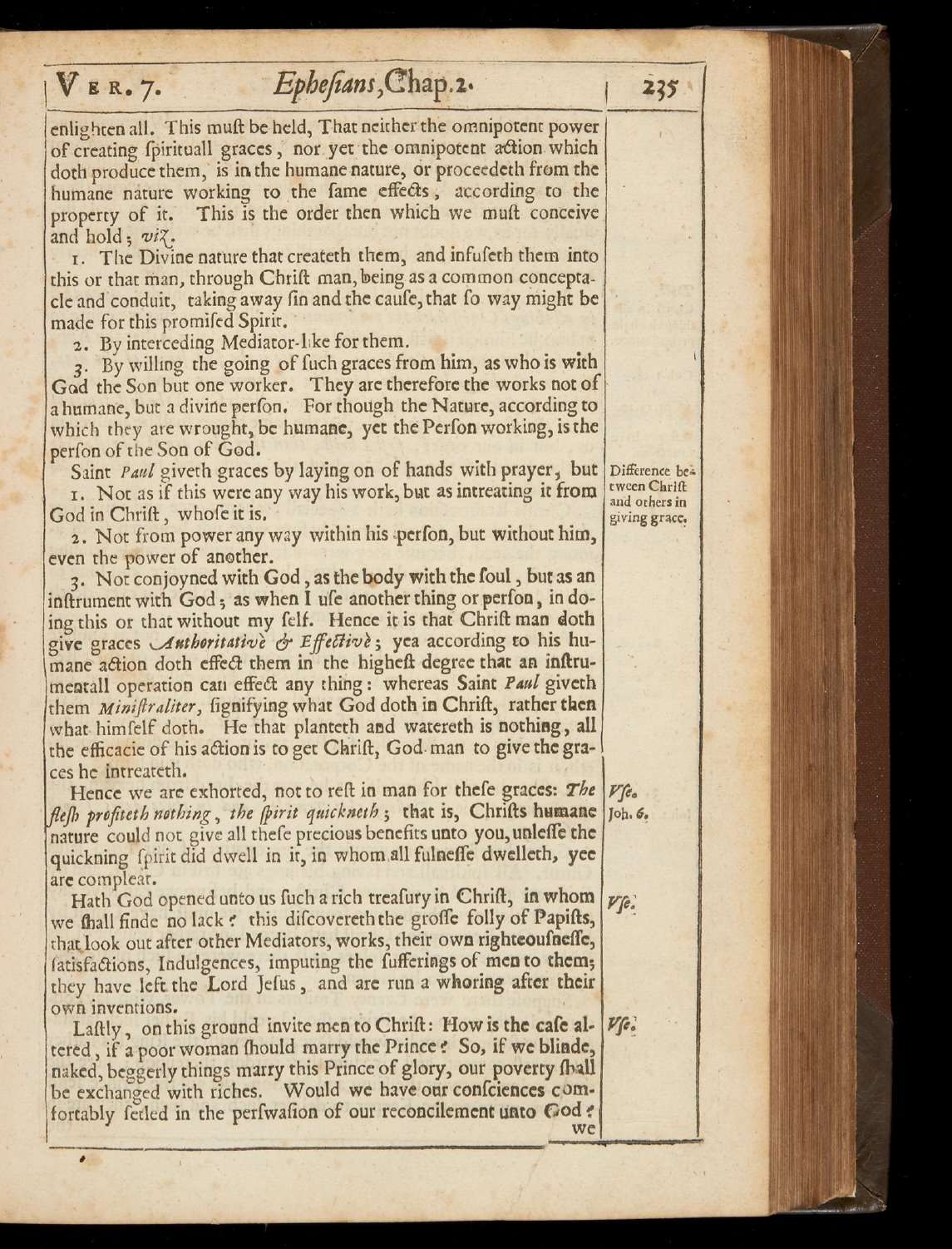

g
R.
7.
Ephefianr,Chap.z.
235
enlighten all. This muft
be
held,
That
neitherthe
omnipotent power
of
creating fpirituall
graces,
nor yet the omnipotent
action
which
doth produce them,
is
in the
humane nature,
or
procecdeth from the
humane nature working
to the
fame
effe&s
,
according to the
property
of
it.
This
is
the
order
then which
we
mutt
conceive
and
hold
;
vq,
r.
The
Divine nature
that
createth
them,
and infufeth them into
this
or that man, through
Chrift
man, being
as
a
common
concepta-
cle and
conduit,
taking
away
fin
and
the
caufe,
that
fo way might be
made for this promifed Spirit.
2.
By
interceding Mediator
-Ile
for
them.
3.
By willing
the going
of
fuch graces
from him,
as
who
is
with
God
the Son but one
worker.
They
are
therefore the works
not
of
a
humane, but
a
divine
perfon.
For though
the Nature,
according
to
which they are
wrought,
be humane, yet the Perfon working,
is
the
perfon
of
the
Son
of
God.
Saint Paul
giveth
graces by laying on
of
hands with
prayer, but
Difference
be
rween
Chrl
r. Not
as
if
this were any way
his
work, but
as
intreating it
from
a
and others in
God
in
Chrift,
whore
it is.
giving grace.
2.
Not
from power
any
way within his perfon,
but without him,
even
the power
of
another.
3.
Not
conjoyned with
God
,
as
the
body with
the foul
,
but
as an
inftrument
with God
;
as
when
I ufe
another thing or
perfon,
in
do-
ing
this or
that without my
felt. Hence it
is
that
Chrift
man
doth
give graces
tstboritaaivé
& Effellivé;
yea
according
to
his
hu-
mane a6tion
doth
effe&
them
in
the higheft degree that
an inftru-
mentall operation
can effe& any thing
:
whereas
Saint
Paul giveth
them Miniflraliter, fignifyingwhat
God
Both in
Chrift, rather
then
what himfelf
Both. He
that
planteth and watereth
is
nothing,
all
the efhcacie
of
his
a
&ion
is
to
get
Chrift, God
man to give
thegra-
ces
he intreateth.
Hence we are
exhorted, not to
reft
in
man
for
there graces:
The
pp.
efh
preßteth
nothing,
the
¡pirit
quickneth
;
that
is,
Chrifts humane
Ioh.6.
nature could
not
give
all
there precious benefitsunto you,
unleffe
the
quickning fpirit
did
dwell
in
it,
in
whom, all
fulneffc
dwelleth,
yee
are
complex..
Hath God opened unto
us
fuch a rich
treafury
in
Chrift,
in
whom
vii.:
we
(hall
finde no lack this
difcovereth
the
groffe
folly
of
Papifts,
thatlook out after other Mediators, works, their own
righteoufneffe,
latisfa
&ions,
Indulgences, imputing the
fufferings
of
men
to them;
they have left
the Lord
Jefus,
and
are run a
whoring after their
own
inventions.
Laftly,
on this ground invite men
to Chrift: How
is
the
cafe al-
PP:
tcred
,
if
a
poor woman
fhould
marry the Prince
e
So,
if
we blinde,
naked,
beggerly things marry this Prince
of
glory,
our
poverty
fhall
be exchanged with riches.
Would
we have our confciences
com-
fortably fetled
in
the
perfwafion
of
our
reconcilement unto
God
we

















